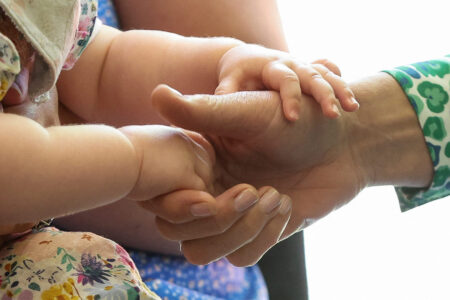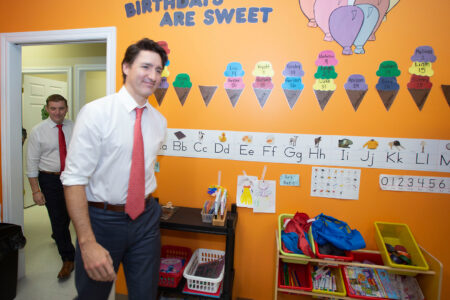
Long before this pandemic made clear to many Canadians that child care is a key part of our economic infrastructure, the Royal Commission on the Status of Women made it a central recommendation. More than 50 years later – despite decades of debates, task forces, special committees and failed multilateral agreements – we continue to await meaningful and widespread solutions for child care. Today, parents, even those well-educated and employed, continue to struggle to afford this basic necessity. This impact hits even harder at those living in rural and remote areas, the working poor or single-income homes, and those living in a high-cost urban centre like Toronto or Vancouver.
Even prior to the pandemic, child care was a key issue. The federal Liberal party committed to the creation of 250,000 before-school and after-school care spaces and the reduction of fees by 10 per cent during the 2019 campaign. By early 2020, in the leadup to the planned federal budget, which would be postponed as COVID-19 crashed onto our shores, then-finance minister Bill Morneau had reportedly been told by officials that child-care costs in particular were a central concern to Canadians. In September 2020, Prime Minister Justin Trudeau acknowledged the concern in the speech from the throne.
The truth is, despite the many promises and commissions, we have taken only incremental steps toward early learning and child care (ELCC), with failing results. Look no further than the 2020 UNICEF rankings where Canada is 33rd out of 35 OECD countries for enrolment of kids five years old and under in early childhood education. As with too many aspects of our social infrastructure, COVID-19 has further unmasked the issues that exist with child care, highlighting that these issues are worse than we thought, especially for those who need help the most. The upcoming federal budget represents a unique opportunity for bold, comprehensive and transformational investments in ELCC, an opportunity this government must take.
Seeking equity
Early in the pandemic, in the midst of all the chaos and confusion, the voices of experts such as Kate Bezanson (Brock University), Kerry McCuaig (Ontario Institute for Studies in Education at the University of Toronto) and Armine Yalnizyan (the Atkinson fellow on the future of workers) warned policy-makers that this recession would have a significant impact on women, and highlighted child care as a key solution. Their warnings ring truer after Canadians have now lived through months of homeschooling, school closures and insufficient access to child care.
Many have agreed with these experts, including a recent report by Deloitte that notes that ELCC is more than having a safe place to leave children while adults go to work. It presents significant benefits to children by improving their behavioral and social skills, increasing their mental and physical health, and setting them on the path for better success. ELCC is also an important policy for equity as it disproportionately benefits lower-income Canadians. In fact, ELCC will have important downstream implications such as lowering our dependance on special education, shrinking the wealth gap and greater social cohesion, because ELCC represents an opportunity for children to encounter and appreciate Canadian diversity at an early age.
For parents, beyond increasing workforce participation for women, ELCC is shown to reduce parents’ stress, increasing their health, professional performance and overall prosperity. Considering the devastating impact COVID has had on the economic, developmental, social and health status of millions of Canadian families, ELCC presents an opportunity to tackle, both directly and indirectly, a number of essential needs. This is especially true for Black and Indigenous Canadians, migrants and refugees and other equity-seeking groups who have been severely and disproportionately impacted by this pandemic.
Budget 2021 must go beyond a top-up to the Canada Child Benefit or the creation of another task force, because we need true solutions to the issues before us. We need transformational change in our social architecture.
A family-centred recovery
The government of Canada has been forthright that it intends to make major investments to bring us out of the pandemic recession, and ELCC is likely to be a centrepiece. We propose that the government make bold, transformative and sustainable changes to early childhood education.
First, strong early childhood education should be a non-mandatory entitlement starting at two years of age and therefore properly recognizing the first tier of education – a tier just as important as primary, secondary and post-secondary education. This would complement enhanced parental leave benefits to more families. It should be the norm, whether or not parents are working, and be protected from economic downturns.
It should be universal and therefore accessible to all children, with a focus on providing access and resources for children with disabilities and children from marginalized groups.
We need these systems to be of the highest quality – from the facilities to the training of the staff and the resources available. The upcoming budget is a wonderful opportunity for capital investments in infrastructure to focus on building new spaces. This is a great way to use traditional stimulus investments for a very different recession.
Child care and early childhood education should be publicly funded and managed to allow for a greater equity, transparency and accountability. Public funding of a substantial portion of the operational costs would allow us to make these systems affordable for families. It also means children would not lose care when parents lose jobs. Public funding is vital to help the working poor and middle-income families who do not have access to government subsidies. It is especially vital in high-cost cities such as Toronto and Vancouver, where the cost of child care rivals that of housing.
Making these changes would require a significant investment but would result in a much more significant reward. The Deloitte study also suggested that for every dollar spent, up to $6 could be generated into our economy. The downstream savings from social benefits will be considerable. Therefore, the proposal of the Margaret and Wallace McCain Family Foundation for an additional $8 billion per year from the federal government (in addition to current funding, including emergency funding, to be introduced over five years to move us toward universal ELCC ) is a modest amount in comparison to the level of federal emergency spending on the pandemic. When considering the moral imperative and economic benefits, whether short term or long term, one would agree with Finance Minister Chrystia Freeland that child care and early childhood education are an “economic triple play.”
We should not allow jurisdictional issues to be a barrier to progress. In collaboration with provincial and territorial governments, the federal government can build on the current federal-provincial-territorial early learning and child care bilateral agreements. The Safe Restart Agreements from last June, in which the federal government provided $600 million to the provinces for child care, provides a blueprint for how future investments could be made.
Beyond the high-level funding solutions, the federal government could work with local communities and consider solutions to help specific hot spots, such as grants to municipalities or community organizations as immediate solutions while the system is scaled up. This could be a job for a new secretariat. Indeed, as per the history of our Confederation, we need to ensure local needs are well-considered in our universal plans.
If recent history is to teach us anything, it’s that promises about child care abound while actions remain sparse and insufficient. Budget 2021 will be another key moment in the history of this debate. On April 19, the government has the opportunity to commit to bold measures that will make the lives of citizens significantly better. Universal, high-quality early learning and child care that is a publicly funded and publicly managed entitlement will transform our society.












